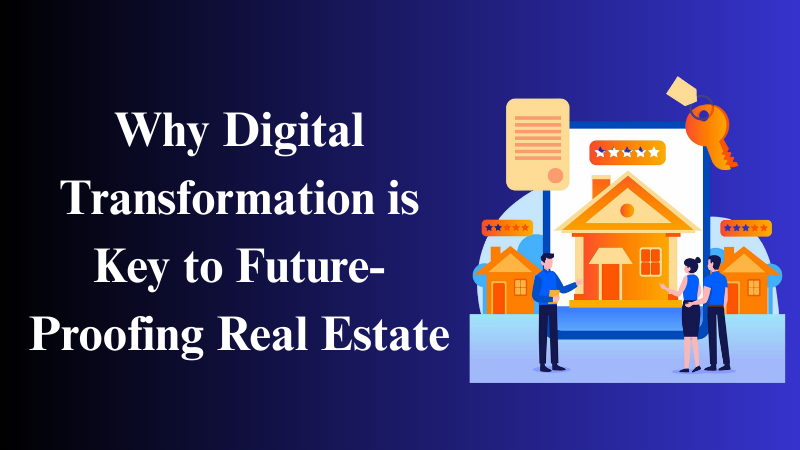Why is Digital Transformation Critical for Future-Proofing Real Estate Today?
Despite the fact that other industries have been quick to adopt new technologies, the real estate industry has been relatively slow. But with digital transformation moving at lightning speed across the economy, real estate companies can no longer afford to lag behind. If you don’t future-proof your business, you’re going to become irrelevant in an increasingly digital-first world.
The Current State of Digital Transformation in Real Estate
Digital transformation is the integration of digital technologies into all aspects of your business, which changes how your business operates and delivers value to your customers. When we look at where real estate stands today, there is significant room for improvement:
- According to KPMG research, only 29% of real estate companies consider themselves “digitally mature”, with seamless processes supported by technology.
- At the same time, 74% of companies recognize the need to adopt more digital tools and strategies but struggle.
- The sector has been slow to adopt new technologies compared to others, ranking second last in digital advancement behind only construction.
Clearly, most real estate firms understand that real estate software development services are necessary to remain competitive. However, the level of urgency and commitment to large-scale change has been lacking so far.
Why Digital Transformation Must Become a Priority
Enabling seamless digital processes across listing, management, transactions, and promotion activities has shifted from a nice-to-have to a must-have for the following reasons:
-
Changing Customer Expectations
Today’s customers, especially millennials and younger demographics, expect on-demand digital services and use their smartphones for most tasks. When it comes to real estate digitalization, they want:
- A user-friendly portal to search and view listings 24/7.
- Instant access to listings, prices, photos, 3D tours, and other property details.
- Digital applications, contracts, payments, and communications.
The companies that don’t provide these digital conveniences are going to lose out on a large segment of the market.
-
Increased Operational Efficiency
Transitioning from manual and paper-based processes to integrated digital platforms makes digital transformation in commercial real estate more efficient by:
- Removing data entry and reconciliation redundancy between systems.
- Centralized data provides a ‘single source of truth’.
- Contract generation is a repetitive task.
- Facilitating remote collaboration between teams and external partners.
It cuts costs, speeds up workflows, and enables employees to work on high-value work.
-
More Informed Decision Making
Leadership can have access to real time dashboards, KPIs and insights that they otherwise would not have using integrated data analytics and business intelligence software. It enables better and faster decisions at both strategic and operational levels.
-
Keeping Pace with the Competition
In an increasingly cutthroat real estate digital transformation landscape, falling behind on digital adoption can result in losing listings and customers to tech-enabled competitors. Brokers must match or exceed the digital experience offered by disruptive proptech startups entering the industry.
In essence, digital transformation real estate is now mandatory to deliver the experience customers expect, gain a competitive advantage, and future-proof the business.
Digital Transformation Priorities for Real Estate Firms
Making the shift from manual processes to seamless digital platforms is a complex undertaking. It requires changes across tools, strategies, and the company culture itself. While priorities will differ between residential brokerages and commercial real estate firms, some key focus areas include:
-
Listing Management
Then, this vital information is centralized in an integrated CRM system that is accessible to the entire company. By doing this, silos are eliminated between agents or departments, and the listing status, client communications, showings scheduled, offer progress, closings, etc., can all be tracked up to date.
-
Client Portals
Self-service portals are essential to give home buyers, sellers, tenants and landlords access to real-time information about their properties. These allow them to schedule property visits, track maintenance requests, pay rent online, read statements, sign documents, and so on, and all of it is much more convenient and transparent.
-
Paperless Transactions
Going digital with closings cuts down on time and errors and reduces compliance risk inherent in paper contracts, checks, and records. This requires secure digital signature platforms and integrations with banking systems for online payments.
-
Mobile Capabilities
Because agents and employees are using smartphones or devices they can access information and tools from anywhere. This enables faster response times and better on site help during showings or inspections.
-
Analytics and Business Intelligence
They have built-in analytics and intelligent dashboards that give you more visibility into KPIs such as listing volume, sales velocity, agent performance, customer retention metrics, collections and more to help you plan.
Choosing the Right Technology Approach
The above priorities showcase how digital transformation in real estate enables data centralization, workflow automation, stakeholder collaboration, and analytics. Making this shift requires identifying and implementing the right technologies for your company’s needs and capabilities. While large real estate firms may opt for custom-developed systems, most small-to-midsize brokers and property managers are better served by integrated Software-as-a-Service (SaaS) platforms.
These solutions combine listing/tenant management, client portals, e-signature workflows, analytics, and more within a single interface instead of disparate tools. The benefits over traditional software include:
- Cost – SaaS platforms have lower upfront costs compared to on-premise solutions and are paid for via monthly/annual subscriptions based on usage. This turns IT expenditure from a large fixed capital investment into a flexible operating cost.
- Speed – Getting started is faster with a SaaS system that is already integrated instead of attempting to build extensive custom integrations between different software tools.
- Scalability – Cloud-based SaaS software scales up or down more easily to accommodate business growth and seasonal fluctuations in the real estate market.
- Accessibility – SaaS platforms enable access from any device via the internet, allowing employees and external stakeholders to collaborate in real-time from anywhere.
- Upgrades – New features, integrations, and capabilities are added seamlessly over time, so the system continues to meet your needs.
When assessing SaaS platforms, look for solutions built specifically for real estate rather than generic software with deep functionality across listings, transactions, and analytics. The system should consolidate all mission-critical systems of record into a single source of truth.
APIs and integrations will also be necessary to incorporate other tools, such as marketing systems, data providers, e-signature services, payments engines, accounting software, and other real estate technologies you rely on.
Driving Organizational Change Alongside Technology Change
Beyond selecting the right software, real estate companies must also address the human side of digital transformation:
- Communicate the “Why” – Leadership needs to continually communicate the pressing business reasons why digital optimization is a must to gain buy-in across the company.
- Train Employees – Adoption ultimately hinges on employees becoming adept and comfortable with new digital platforms. Training and change management programs will be essential.
- Incentivize Usage – Tie system usage and other digital metrics to individual sales agent’s compensation and rewards programs. This drives quicker adoption across user groups who may be technology averse.
- Develop Digital Literacy – Digital skills development should become part of ongoing talent development, not just one-off training. This will keep staff skills aligned with regular technology upgrades.
- Embrace Data-Driven Decisions – Adopting analytics and performance benchmarks requires leaders to become comfortable basing decisions on data insights from new technology rather than gut instinct alone.
Start Small But Scale Fast
Given the vast scope of digital transformation, it is impractical for most real estate companies, especially large brokerages and property management firms, to tackle everything at once. The key is to identify a few priority areas with the biggest business impact as early digital transformation proof of concept.
For example, many brokers are seeing huge efficiency gains by first targeting paperless transactions. After streamlining this process end-to-end, they can shift focus to listings consolidation or self-service portals.
If one of the early target areas shows bottom-line results, companies can justify scaling digital platforms across the organization. Gradual expansion combined with change management helps smooth the adoption curve.
While moving slowly initially, real estate firms must then scale their digital solutions rapidly across the entire operation to meet customer expectations and outpace the competition.
Becoming a Digital-First Real Estate Broker
As real estate goes through large-scale digital transformation, brokerages and property management firms have an opportunity to reposition themselves at the forefront of the industry by making digital enablement central to their value proposition.
In other words, it means eliminating manual processes and moving to fully integrated systems and customer experiences. Some hallmarks of digital-first real estate firms include:
- With centralized listing data, you have complete visibility and tracking from the time a property is listed to the time of close.
- Better decisions are made at all levels with intelligent analytics.
- Complex transaction processes are accelerated by automated workflows.
- Digital channels of customer engagement drive loyalty and referrals.
- Remote accessibility allows for real-time response and productivity.
- Integrated systems have no redundancies or bottlenecks.
Digital transformation is a huge shift, but the long-term payoff is priceless. Those who start down this path today will be the best positioned to thrive in tomorrow’s real estate environment.




